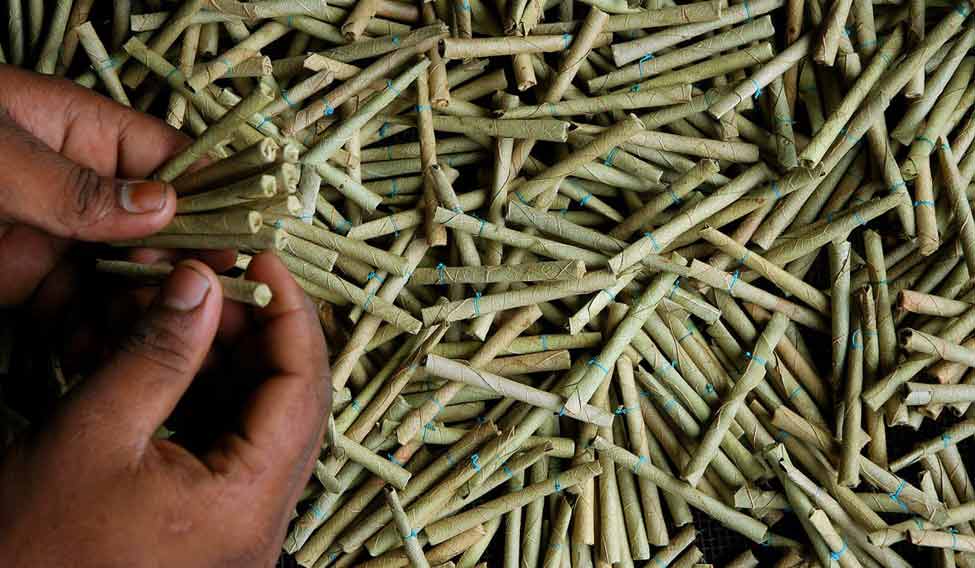The tobacco industry on Friday termed as "motivated" a recent study, which had found tobacco products cheaper than essential food items, saying it was an attempt by anti-tobacco activists to "influence" policy-makers on the taxation issue during the forthcoming Budget Session.
Noting that anti-tobacco activists based their advices on the study which is not only "outdated" but also at "variance with more recent study by the WHO, Tobacco Institute of India (TII) said the recommendations also "overlooked undesirable consequences" of high and discriminatory taxation on cigarettes.
"The release of this study in media just before the Union Budget 2016-17 appears to be motivated and a deliberate attempt by anti-tobacco activists to misinform and influence policy-makers on tobacco taxation by basing their recommendations on a study which is not only outdated but is also at variance with a more recent study released by WHO itself in 2015.
"The recommendations made in the study also overlook the undesirable consequences of high and discriminatory taxation on cigarettes, the objectives of tobacco control in the country, government revenues and the livelihood of millions of farmers and others that are dependent on tobacco," TII said in a statement.
Seeking to reduce tobacco consumption in the country, a study commissioned by Health Ministry and WHO on Friday recommended increasing tax on all types of tobacco products and withdrawal of tax exemption to 'bidi' manufacturers.
"Prices of tobacco products in the country have not increased substantially over time, thus making these products even cheaper than essential food items," the study said.
"It is important that a clarification is issued on this outdated study which is also at variance with a study on tobacco taxation released by WHO itself with more updated information in 2015.
"The timing of the release of the ISID/PHFI Study is questionable and appears to be a concerted attempt by anti-tobacco activists to create incorrect perceptions on Tobacco Taxation Policy in the country," it said.
The statement said that over the last three-and-a-half years, the incidence of Central Excise Duty and state VAT on cigarettes, at per unit level, has gone up cumulatively by 98 per cent and 124 per cent respectively which is exerting severe pressure on the legal cigarette industry.
This is taking place even as sale of illegal cigarettes is growing unabated and the overall tobacco consumption continues to shift to cheaper non-cigarette tobacco forms, it said.
"As a result of punitive taxation on cigarettes since 2012-13 the legal cigarette industry in India has dropped from 110 billion sticks in 2011-12 to 95 billion sticks in 2014-15 and is expected to drop further in the current year," it said.
It said that an analysis of the data contained in the WHO Report on Tobacco Taxation, 2015 reveals that at 6.5 per cent of per capita GDP, cigarette taxes (Excise Duty and state VAT) in India are amongst the highest in the world.
"In fact, cigarette taxes in India are 14 times higher than USA, nine times higher than Japan, seven times higher than China, five times higher than Australia and three times higher than Malaysia and Pakistan," it said.
It said that the incidence of high taxes has made legal cigarettes extremely "unaffordable" in India and the WHO Report 2015, which measured affordability of cigarettes as a proportion of GDP per capita required to purchase 100 packs of 20 cigarettes of the most sold brand, has found affordability in India very low compared to other countries.
"In India this ratio is 10.8 per cent, which is higher than most developed and developing countries (USA 1.14 per cent, Russia 1.31 per cent, Germany 1.55 per cent, Canada 1.68 per cent, China 2.14 per cent, Australia 2.53 per cent, UK 2.87 per cent, Malaysia 3.4 per cent and Pakistan 3.73 per cent).
Terming the tobacco consumption pattern in India as "unique" where only 11 per cent of total tobacco is consumed in the form of legal cigarettes, TII said that the balance 89 per cent is consumed in other forms of tobacco consumption and illegal cigarettes.
It said that legal cigarettes contribute the majority 87 per cent of the excise revenue from tobacco despite their very small share of total tobacco consumption in the country.
"The reason for this distorted pattern of revenue collections is that cigarettes are subjected to high and discriminatory rates of taxation compared to other tobacco products," it said.
TII said that compounding the issue is the fact that while the legal cigarette industry in India which is in the organised sector, has statutory oversight and is completely compliant with all regulations, the bulk of tobacco consumed in the country is largely produced in the unorganised sector
"Extremely high tax rates on cigarettes provide a profitable arbitrage opportunity for tax evasion in India," it said and referred to Euromonitor International report which states that India is the 4th largest illegal cigarette market in the world.




